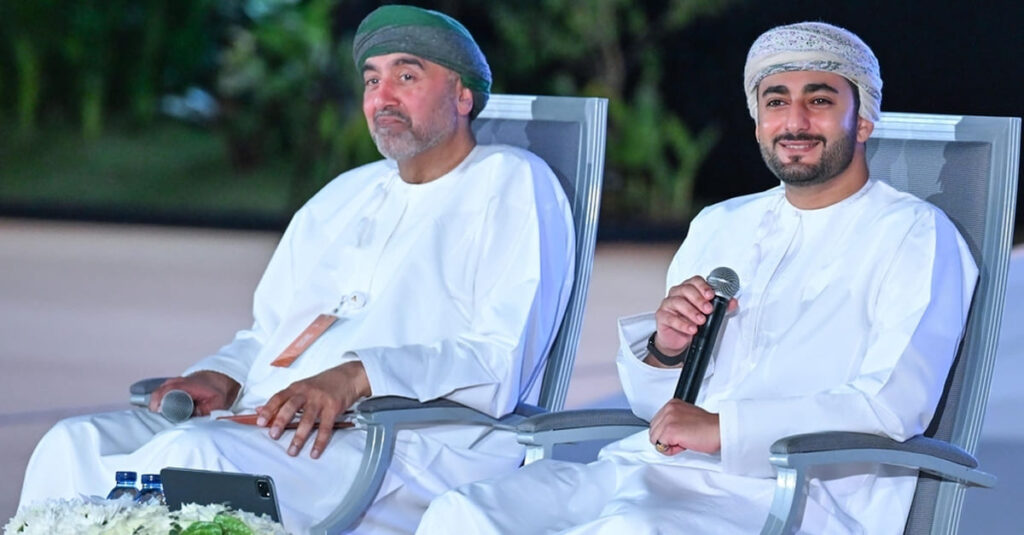
MUSCAT – HH Sayyid Theyazin bin Haitham Al Said, Minister of Culture, Sports and Youth, stressed keenness to enhance dialogue between the government and citizens in all decisions taken of concern to society. HH Sayyid Theyazin said that the 3rd dialogue session on “Culture, Sports and Youth”—held as part of “Together We Progress” Forum—laid emphasis on outstanding achievements in the fields of culture, sports and youth. HH Sayyid Theyazin pointed out that there is cooperation with the Ministry of Education to support talents at an early age. He reiterated the desire of the Ministry of Culture, Sports and Youth to discover the potential of talents in cultural or sports fields. Currently, emphasis is laid on the integrated sports city project, where the sports stadium football serves as a core component which, he added, would offer the Sultanate of Oman an opportunity to host regional and international tournaments.
HH Sayyid Theyazin added that the Military Discipline Programme saw the participation of nearly 700 students in 2024. He described the programme as “an enriching experience that builds and hones young people’s skills, preparing them to face the challenges of the future”.
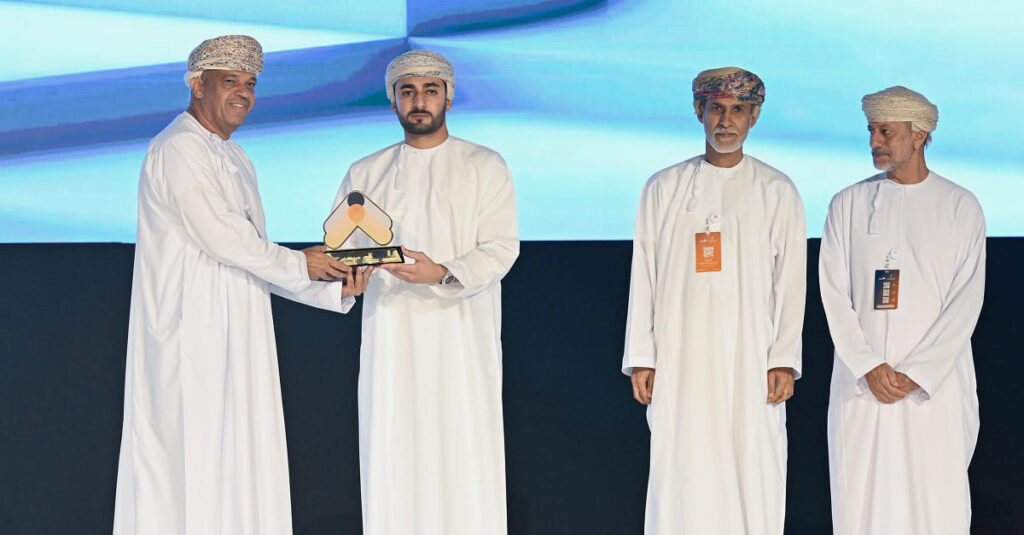
For his part, Sayyid Said Sultan Al Busaidi, Undersecretary of the Ministry of Culture, Sports and Youth for Culture, said that the Ministry focuses on maximizing gains from industries of the cultural sector. He added that many studies in this regard are being conducted in cooperation with different government departments.
Basil Ahmed Al Rowas, Undersecretary of the Ministry of Culture, Sports and Youth for Sports and Youth, pointed out that updates to the Omani sports strategy, approved in mid-2024 after in-depth study of the reality of Omani sports, dealt with four main components: society, sports, governance of sports bodies and sports economy. The designs for the sports city project have been finalized and action is now focused on the stage of the city’s main components, said Al Rowas, noting that all the details will be announced shortly.
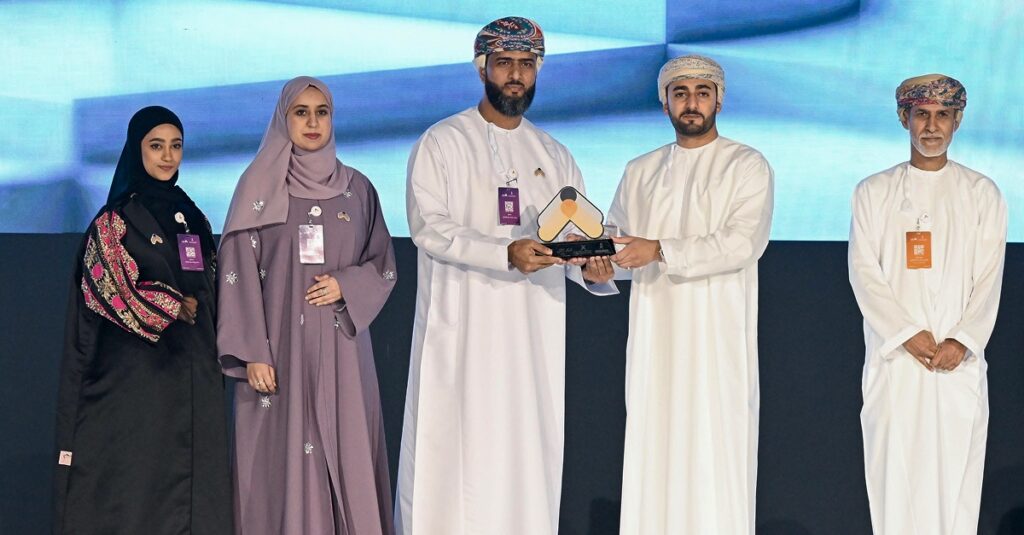
Al Rowas pointed out that the Ministry of Labour issued a decision in December 2024 to disengage from official duty the civil service sector players throughout the sports season. He added that steps are underway to study similar measures for players from other sectors. He pointed out that the Ministry is implementing many programmes that contribute to sponsoring promising athletes, including the preparation centres to groom talents in a number of sports in cooperation with clubs and sports federations. The dialogue session on the future of professions and jobs in the Sultanate of Oman also reviewed the visions and aspirations for the labour market.
The dialogue session saw the participation of Dr Mahad Said Ba’owin, Minister of Labour, Sayyid Salim Musallam Al Busaidi, Undersecretary of the Ministry of Labour for Human Resources Development, Khalid Salim Al Ghammari, Undersecretary of the Ministry of Labour for Labour, and Dr Ali Amir Al Shidhani, Undersecretary of the Ministry of Transport, Communications and Information Technology for Communications and Information Technology.
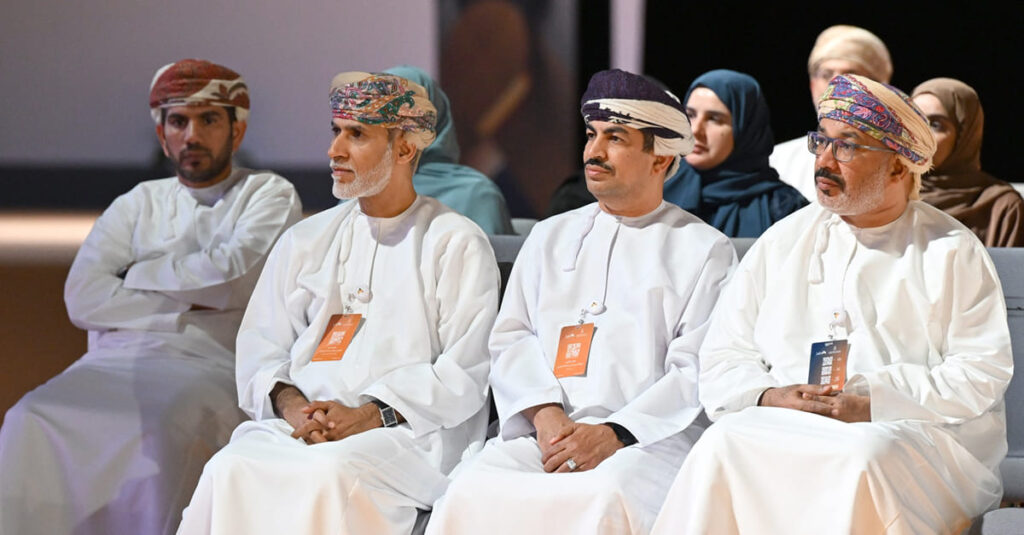
The Minister of Labour said that the labour market requires various additional skills. The Ministry, he added, is working on bridging the gap through training before employment and on-job training. The Ministry, he noted, allocated 9,000 training opportunities followed with employment during 2024. It also increased the number to 14,000 opportunities in 2025. Employment in the public sector, the minister explained, will be on an actual-need basis, especially in the health and education fields which offer around 6,000 job opportunities annually, as well as the military sector with a similar number. He pointed out that economic movements in the Sultanate of Oman resulted in new investments, which will require time to see their yield in terms of employment.
For his part, the Undersecretary of the Ministry of Labour for Human Resources Development explained that the outputs of vocational education receive acceptance for employment in some public and private sectors. There are more than 8,000 students in 8 colleges, indicating that there is a trend to evaluate the training system in the Sultanate of Oman at the government, private and vocational training levels. He pointed out that more than 66 companies and 43,000 job seekers participate in the “Tawteen” platform. The platform pertains with matching the vacant positions with the job seekers’ qualifications. When there is a match, the job seeker is contacted. He explained that the ministry is working on preparing graduates before entering the labour market by establishing digital incubators and incubators in ministries and major companies.
On his turn, the Undersecretary of the Ministry of Labour for Labour said that there are initiatives for contracts in the field of refrigeration and air conditioning whereas skilled people who graduated from vocational colleges can compete for. He noted that a team has been established to promote the graduates of training colleges and their specializations in the labour market.
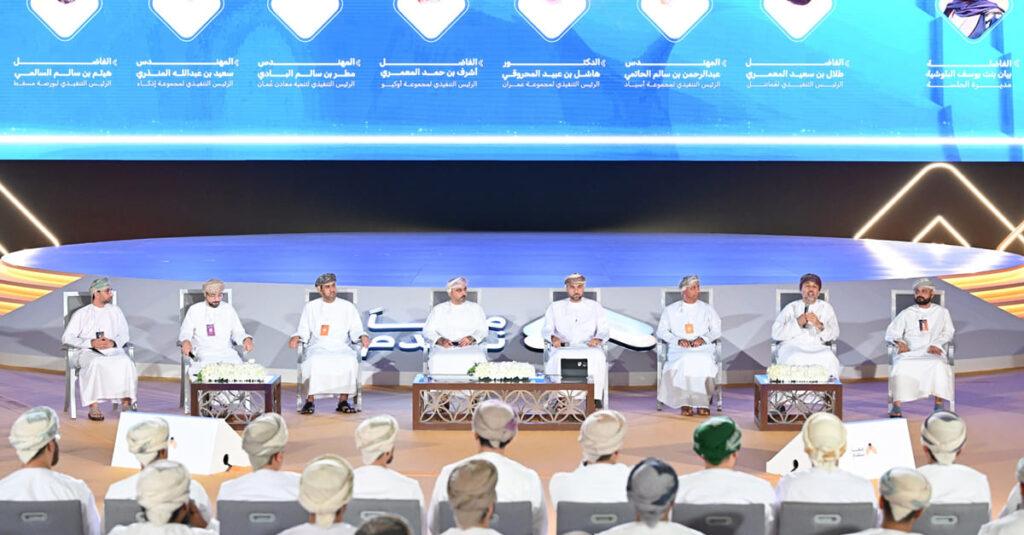
Furthermore, the Undersecretary of the Ministry of Transport, Communications and Information Technology for Communications and Information Technology said that training, qualification and drafting the right policies are among the most prominent steps being worked on for the labour market in light of the technological leaps and the witnessed development and loss of some types of jobs. The Undersecretary added that the government responds to future professions through various programmes, including the “Makin” initiative, which seeks to provide income-generating opportunities for Omani youth in the digital sector. The Ministry of Labour, he affirmed, has trained 100 people in the field of semiconductors as an example.
The second discussion panel touched on the retirement scheme that is addressed by the social protection system in the Sultanate of Oman. The scheme aims to enhance protection for all working groups after the end of their work period in the public and private sectors. This session was participated by Eng. Salem Nasser Al Aufi, Minister of Energy and Minerals, Chairman of the Board of Directors of the Social Protection Fund and Dr. Faisal Abdullah Al Farsi, CEO of the Social Protection Fund.
The Minister of Energy and Minerals pointed out that the total number of beneficiaries from the Fund’s scheme reached more than 1.472 million people till February 2025. The fund covers different segments, namely seniors, children, people with disability, widows, orphans and low-income families. The Minister said that work is underway to enhance the social protection system, and that community comments and suggestions are being monitored to improve the system.
For his part, the CEO of the Social Protection Fund said that the Social Protection Law focuses directly on the family through some of the benefits that are provided. He indicated that the number of active Omani insured persons with the Social Protection Fund reached around 590,000 people in all social insurance programmes.
The forum concluded its work with the fourth discussion panel on economic diversification sectors. This session reviewed the qualitative projects that are being focused on by companies affiliated with Oman Investment Authority (OIA) to enhance economic sustainability and explore the prospects for development and innovation in various sectors. The session was attended by Eng. Abdulrahman Salem Al Hatmi, CEO of Asyad Group, Dr. Hashel Obaid Al Mahrouqi, CEO of Omran Group, Ashraf Hamad Al Maamari, CEO of OQ Group, Eng. Matar Salem Al Badi, CEO of Minerals Development Oman, Eng. Said Abdullah Al Mandhari, CEO of ITHCA Group, Talal Said Al Maamari, CEO of Omantel, Haitham Salem Al Salmi, CEO of Muscat Stock Exchange and Abdullah Mohammed Al Rashdi, CEO of Oman Food Investment Holding Company.
During the panel, the CEOs discussed the projects implemented by their companies in various sectors and their contribution to employment and Omanisation efforts, empowering national competencies, and focusing on digital transformation in their businesses and activities. The CEOs stressed the importance of enhancing In-country Value (ICV) through the programmes and initiatives undertaken by these companies to empower small and medium enterprises. This, they affirmed, will contribute to enhancing the competitiveness of the national economy.
During the event, HH Sayyid Theyazin bin Haitham Al Said, Minister of Culture, Sports and Youth felicitated the winners of the “Idea Makers” initiative in its second edition within the “Together We Progress” forum. The initiative covers three areas, which are governorates development, challenges facing government companies, and academic research specialized in localizing modern technologies.
In the segment of governorates development, the Gelatos Team won first place for its innovation of manufacturing of halal gelatin from fish waste. The Previe Team, which innovated a natural preservative extracted from marine waste, won second place. The third position was bagged by the Innovation Team for its innovation of a drone developed with artificial intelligence to treat potholes on asphalt roads.
In the segment of ‘challenges facing government companies’ the Info8 Team won first place. The team developed a digital platform supported by artificial intelligence that helps companies detect and predict leaks in water pipelines. The Ardak Team came in second place for its project to use local biogenetic resources to extract minerals and value-added products. The third place was won by the Wadi Ronb / Cold Asphalt Team for its idea to convert demolition and construction waste into cold asphalt used in road maintenance.
In the segment of academic research specialised in localising modern technologies, the research project “Plastic with Added Value” won first place. The second position was won by the project for treating filtrate, which is concerned with bio coagulation using natural tannins extracted from date seeds. The project of studying the selection of the most efficient reverse osmosis membranes won third place.
Dr Abdullah Nasser Al Harrasi, Minister of Information, said that the “Together We Progress” forum constitutes an important platform for dialogue between members of society and government departments. The minister pointed out that this edition of the forum achieved great success. He explained that the forum saw in-depth dialogue through which members of society presented many visions and ideas about various aspects of government action in various areas, such as the economy, investment, economic diversification and the development of governorates.
Dr Abdullah told Oman News Agency (ONA) that these visions are accorded attention by the government, which studies the visions in depth. The first day included a presentation about the proposals made by members of society during the 2ndedition of the forum, said the minister, noting that the current edition of the forum also outlined the achievements made and the tasks implemented through the endorsement of government decisions, policies and programmes. The Minister of Information explained that the ideas and visions of community members, notably the youth, are considered by the government as an important basis for developing government work. He added that such opinions reflect conscious social participation in national development.
Over two days, the forum included two sessions covering the topics of economy and development. The discussions highlighted features of the upcoming five-year development plan, as well as efforts of economic diversification and investment and its role in developing the national economy. Together We Progress also included five discussion panels which covered the topics of governorates development and their role in boosting the national economy, the future of professions and jobs, the retirement scheme, culture, sports and youth, and the future of economic diversification sectors.
During the first day of the forum, three national electronic platforms were launched in a bid to enhance the quality of the offered government services, as well as easing access to these services.
Together We Progress constituted a platform that enhances interaction and communication between the government and the society. It also sheds light on policies, development programmes and government initiatives.
The forum constitutes a chance for citizens to express their opinions and suggestions and to voice their interests and the challenges they face to officials in a participatory environment.
(Source: ONA)

0 Comments